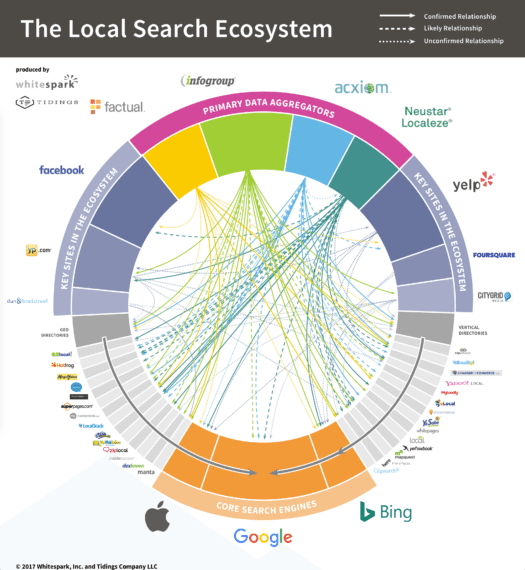
Local and regional companies have more advantages against the national and global players than they often realize. And when it comes to the insurance industry, everyday consumers are inundated with humorous national advertising campaigns that often tout bundling cost savings and generalized expertise.
While these massively funded campaigns are certainly effective, they share a common flaw: they cannot focus on local, often rural markets. Many of these rural customers appreciate the benefits of local insurance providers who take the time to understand their specific, localized needs. Finding these customers and building loyalty traditionally occurred through word of mouth, legacy referrals – the shingles on Main Street. Today, there is another powerful tool that can and must be harnessed: internet search.
A robust local search strategy is a must for insurance agents who want to build strong, lasting customer relationships.
Virtually all shopping starts with an internet search
Search has forever fundamentally changed how people shop. Even if they intend to make several phone calls or visit several insurance agents, customers will source their information from the internet – and 90% of those journeys begin with Google. So, what happens if your agents don’t appear at the top of the search results, but your competitors’ do? Well… you won’t write that policy.
One way to ensure your company and agents receive top billing is through the accuracy of listings on Google My Business. Most insurance companies rely on their agents to file these listings themselves, but they are generally not closely monitored for accuracy. Aside from having no standard system for entering this information, agents periodically switch companies, move or close offices, enter incomplete listings… and on and on. When these changes happen, they almost never take down or correct their previous listing. As a result, these listings are rife with error. For example, one company whose listings we assessed had 23 different referenced versions of the brand name alone.
An assessment of your company’s listings will be an eye-opening exercise that will document your brand’s relative data health. To help, STIR can arrange a detailed assessment.
Search engine optimization (SEO) is fundamental in the way we find what we are looking for while browsing the web. Essentially, the quality, age, and integrity of a website’s content – and its consistency with Google My Business and other aggregated listings will determine its rankings on Google, Bing, Safari, and other search engines.
What is NAP and why is its consistency important?
There is one component of search marketing that is crucial when people are on a quest for products and services right in their area. NAP — name, address, phone number — is the main contact information for businesses that appears in search results. If this information is not up to date or inconsistent, the search engines and aggregators cannot trust the information, and therefore, it will not be displayed. It then becomes challenging for customers and prospects to reach you or find your business, resulting in missed leads and lost trust.
Many mobile searchers will tap the click-to-call button or link when they want to speak directly with a company. Forrester Research found that click-to-call functionality boosts ROI (return on investment) by 143%. However, if the phone number listed in the NAP listing is incorrect, that potential customer may falsely assume you have closed your doors — definitely a lose-lose situation. You’ve lost a potential customer, and they’ve lost trust in you.
NAP consistency is important for local SEO, as the legitimacy of the information increases insurance agencies’ chances of ranking higher on SERPs (search engine results pages). It also delivers search engines and customers the most accurate information about your business in real time.
How does NAP relate to search engine ranking?
Say an insurance agent changes their address. Their website, which they check regularly, lists the new address. However, unbeknownst to them, their online business listings may feature their old address. Because of this inconsistent information across the web, search engines are unable to detect which address is correct.
Search engines have the unique capability to digitally verify the accuracy of a company’s name, address, and phone number by sending their bots to crawl billions of websites. The site crawlers will eventually spot these inconsistencies, which will lower page rankings. If the data matches, though, the insurance agent will reap higher search results. Those with the cleanest data receive the top listings.
Navigating the local search ecosystem
Local search is only a fraction of the digital marketing ecosystem. This diagram demonstrates the numerous connections between the internet business listing platforms and search engines. While this map is constantly being expanded, these business data providers rely on one another, so people get the results they seek.
The rise of local intent
“Near me” search queries have grown by over 200% in the past two years alone. What does this tell us? It is a human truth that people appreciate convenience. Local intent is a search trend that suggests people are interested in what’s nearby and they often include the phrase “near me” or their city names in their search queries. Today, 78% of consumers use the internet more than once a week to find information about local businesses, and 86% use Google Maps to find local businesses.
Check NAP data regularly
At the absolute minimum, it’s recommended to check your business’s NAP data on a quarterly basis. Updates should be made as soon as the insurance agent moves companies or office locations, gets a new phone number, or makes any other change to their business. Make these modifications a regular part of your business routine.
Top indicators of success
So, how exactly is local search success measured? Some key performance metrics include:
- An increase in Google Maps searches and views (as seen in the Google My Business dashboard)
- An overall improvement in organic traffic to your website (as seen via Google Analytics)
- Higher rankings for local keywords (i.e., service + location) on SERPs
- Less incorrect/outdated data · A larger inventory of agent listings with correct data across internet directories (e.g., Google My Business, Bing, Yelp, Facebook, Apple Maps)
When it comes to insurance, some customers are local loyalists. At the end of the day, these folks would rather work with an agent right in their neighborhood. Local agents can tailor their clients’ coverage, provide personalized advice, help their clients understand and navigate complex policies, and ensure adequate coverage in the event of a disaster. Local insurance agents are known to be responsive, accessible, and knowledgeable of the surrounding area. A strong local SEO presence can help an insurance agent build their brand and establish themselves as a reliable expert — even among the giants.
How we can help
Not sure where to start? Here’s where STIR can come in. First, if you have the time, perform a quick self-audit to see where your insurance agency listing appears in the search results. This can be evaluated in several ways:
- Does your company name, address, phone number, website, hours of operation, and other information appear in Google Maps listings?
- Are there any agents missing?
- Are any agents who have left the firm appearing?
- If agents have moved, is their old address or phone number on display?
- Are there any duplicate listings?
Once you have a better idea of your agency’s search presence and data accuracy, we can perform a thorough evaluation. We would be thrilled to help your insurance brand become discoverable. To learn about our local SEO and NAP services, feel free to contact Brian Bennett at bbennett@stirstuff.com.




